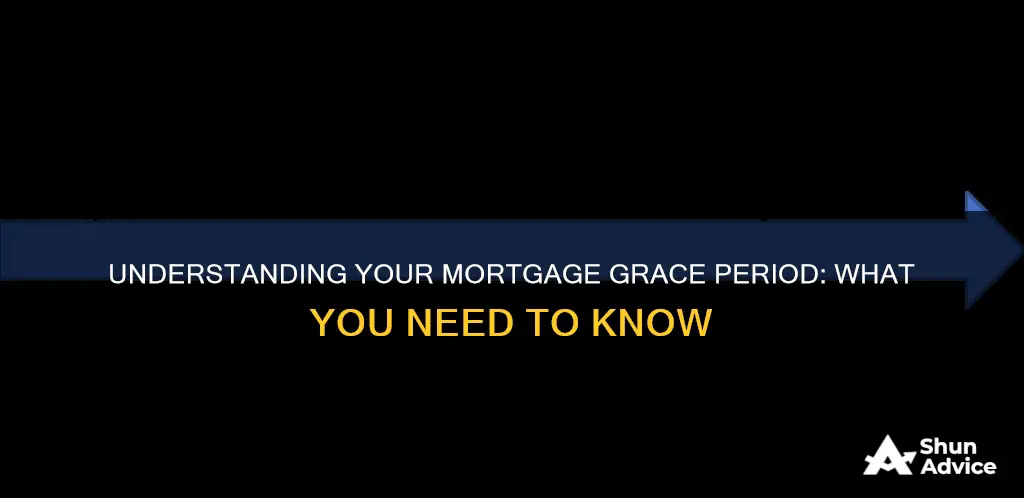
A grace period is a set amount of time after the due date of a mortgage payment during which any penalties are waived. The length of a grace period varies by lender but is typically 15 days or two weeks. If you don't make your payment within this timeframe, you will be charged a late fee. To find out the length of your grace period, check your mortgage contract or contact your lender.
| Characteristics | Values |
|---|---|
| Grace period definition | A grace period is a set amount of time following the due date of a mortgage payment when any penalties are waived. |
| Grace period duration | Typically 15 days or 2 weeks, but the exact length depends on the lender, lease arrangement, and history with the lender. |
| Grace period benefits | During the grace period, no late fees are charged, and the delay cannot result in default or cancellation of the loan or contract. |
| Grace period and credit score | Payment after the due date but during the grace period generally does not affect the borrower's credit score or result in negative credit reporting. |
| Grace period and late fees | If the full payment is not made during the grace period, a late fee will be charged, and the missed mortgage payment may be reported to credit bureaus. |
| Finding your grace period | Check your mortgage contract or contact your lender to find out the exact number of days your grace period allows. |
What You'll Learn

How long is the grace period for a mortgage?
A mortgage grace period is a set duration of time after the due date of a mortgage payment that forgives the borrower of any penalties as long as the payment is made during that period. If a payment is made after the mortgage grace period, the payment is considered late, and the borrower is subject to penalties. The standard mortgage grace period is typically 15 days or 2 weeks. If your mortgage payment is due on the first of the month and your grace period is 15 days, your payment would be considered late on the 16th. If that falls on a weekend, you may have until the following business day to make the payment, but you should check with your lender to verify these terms.
The amount of time in the mortgage payment grace period varies by lender, so it's important to check your mortgage contract or contact your lender to find out the exact number of days your grace period allows for payment before late fees are charged. Late fees can range from 3% to 6% of your monthly payment amount, and they can add up quickly, making it difficult to catch up on your payments. Once your mortgage payment is over 30 days late, your credit score could drop significantly. Your payment history accounts for 35% of your credit score, and each late payment can severely harm your score.
While grace periods can be a great feature to have in case you accidentally forget to make a payment, it's important to strive to make your mortgage payments on or before the due date. To ensure a consistent payment history, you can set up autopay for your mortgage payments.
Finding Proof of Paid-Off Mortgages
You may want to see also

What are the consequences of paying late?
Paying your mortgage late can have serious consequences for your finances and credit score. Here are some of the potential issues you may face:
Late fees
If your mortgage payment is received after your grace period, your lender will likely charge you a late fee. The amount charged varies, but it is often a percentage of your monthly payment amount, typically ranging from 3% to 6%. This can add up quickly, making it more challenging to catch up on your payments.
Negative impact on credit score
Once your mortgage payment is over 30 days late, your credit score could drop significantly. Your payment history accounts for 35% of your credit score, and each late payment can severely harm it. A low credit score can affect your ability to get other loans or credit in the future.
Foreclosure
Significant delinquencies can result in foreclosure proceedings. The foreclosure process is designed to protect both homeowners and lenders and typically begins 90 days after a missed payment. During this time, you will receive multiple notices and have the opportunity to work with your lender to find a solution. However, if no attempt is made to catch up on payments, you could ultimately lose your house. A foreclosure will remain on your credit report for seven years, damaging your credit score.
Additional fees and penalties
If your payment is more than 60 days late, you may incur additional late fees. Furthermore, once your payment is 45 days late, your lender is required to send a notice of delinquency, which may include information about foreclosure avoidance options or loss mitigation programs.
Difficulty in catching up
Late mortgage payments can lead to a cycle of financial difficulties. The fees and penalties associated with late payments can make it challenging to get back on track. The longer you wait to address the issue and make arrangements with your lender, the more difficult and expensive it will become.
Finding Mortgage Records: A Comprehensive Guide
You may want to see also

What is the difference between a grace period and a deferment?
A grace period is a set length of time after a payment due date during which a borrower can delay payment without penalty. Grace periods are typically built into loan terms, with the length of the grace period noted in the contract. Grace periods are common in instalment loans, such as federal student loans, mortgages, and car loans. During this time, the borrower does not incur any late fees or penalties, and the delay cannot result in default or cancellation of the loan. However, it's important to note that interest may or may not accrue during this period, depending on the loan's terms.
A deferment, on the other hand, is an additional agreement made between the borrower and the lender to delay payments due to financial hardship or other specified reasons. Unlike grace periods, deferments usually require an application and documentation. While payments are not required during a deferment, interest typically continues to accrue, increasing the overall loan amount. Deferments are most common for student loans, both federal and private, but can also apply to mortgages and car loans.
In summary, the key difference between a grace period and a deferment is when a borrower qualifies for each delayed payment option and whether it is automatically granted or requires additional approval. Grace periods are typically built into the loan terms and provide a short period of flexibility after the due date, while deferments are usually agreed upon separately and are intended for longer periods of financial difficulty.
To find the grace period for your mortgage, check your account agreement or online account for details. This should specify the grace period and any associated terms and conditions.
Finding Assumable Mortgages: Strategies for Success
You may want to see also

Can I avoid paying late fees?
Yes, you can avoid paying late fees by paying your mortgage on time. However, if you are unable to pay on time, most mortgage contracts include a grace period, which is a set time after your due date during which you can still make a payment without incurring a penalty. The grace period typically lasts 15 days, but it can vary by lender. During the grace period, you can make your mortgage payment without facing late fees or other negative consequences. After the grace period ends, your lender may assess a late fee, which is typically between 3% and 6% of your monthly mortgage payment amount.
To avoid paying late fees, it is important to review your mortgage contract or contact your lender to understand the terms of your loan, including the length of the grace period. Maintaining a consistent payment schedule and paying before the due date is ideal. However, if you miss the due date, paying during the grace period can help you avoid late fees.
Additionally, if you are facing financial difficulties, don't ignore your lender's calls. They may be able to work with you or refer you to resources that can help. Federal law requires the lender to assign a company staff member to your file, who can assist you in finding available assistance options.
In summary, while paying your mortgage on time is the best way to avoid late fees, taking advantage of the grace period can provide you with some flexibility. However, it is important to remember that the grace period should not be relied upon as a consistent payment schedule is always best.
Chase Mortgage Account: Locating Your Number Easily
You may want to see also

What happens if I can't pay within the grace period?
If you are unable to make your mortgage payment within the grace period, you will be considered late and may face several consequences. These can include late fees, negative impacts on your credit score, and even the risk of losing your home.
Late fees can be a set amount or a percentage of your principal and interest, typically ranging from 3% to 6% of your monthly mortgage payment. These fees can add up quickly, making it more challenging to catch up on your payments. For example, if you have a monthly mortgage payment of $1,200 and incur a 3% late fee, you will need to pay an extra $36.
Additionally, once your mortgage payment is over 30 days late, your credit score could drop significantly. Your payment history accounts for 35% of your credit score, and each late payment can severely harm it. A low credit score can make it more difficult to obtain loans or favourable interest rates in the future.
In more severe cases, consistent delinquency can lead to foreclosure and the loss of your home. Therefore, it is essential to prioritize making your mortgage payments on time and only utilize the grace period when absolutely necessary.
If you anticipate difficulty making your mortgage payment, it is best to be proactive and communicate with your lender as soon as possible. Explain your circumstances and work with them to find a solution or alternative arrangement. Maintaining open communication can help prevent or mitigate potential negative consequences.
Finding Your Wells Fargo Mortgage Balance: A Guide
You may want to see also
Frequently asked questions
A grace period is a set amount of time following the due date of a mortgage payment when any penalties are waived. During this period, no late fees are charged, and the delay cannot result in default or cancellation of the loan or contract.
The grace period for a mortgage typically lasts 15 days, but it can vary by lender.
If your payment is not received within the grace period, you may be charged a late fee, your delinquency may be reported to credit bureaus, and your credit score may be affected.
The grace period for your mortgage should be noted in your mortgage contract. You can also contact your lender to find out the exact number of days your grace period allows.
While it is acceptable to pay your mortgage during the grace period, it is generally best to strive for a consistent payment schedule and make your payments before or on the due date. Relying on the grace period can be risky as processing delays could cause your payment to be late.







